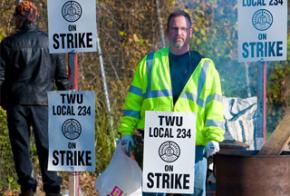Transit workers strike in Philadelphia
reports from Philadelphia on a strike by transit workers with a long history of union militancy.
THE STREETS of Philadelphia have been overrun by cars, bikers and pedestrians this week after transit workers for the Southeastern Pennsylvania Transportation Authority (SEPTA) went on strike early Tuesday morning.
The 4,800 members of the Transport Workers Union Local 234 are striking over wages, pension contributions, health care and workplace rights. The union has been without a contract since March and failed to get SEPTA to budge on anything for many months.
In late October, TWU members overwhelmingly voted in favor of a strike, setting the start date for the eve of the World Series games scheduled in Philadelphia. This immediately got the attention of Gov. Ed Rendell and Mayor Michael Nutter. The two assailed the union for the timing of the strike and along with SEPTA finally pushed for negotiations. Local 234 agreed to delay the strike while the two sides spent several days negotiating.
SEPTA's initial contract offer included a wage freeze for two years, an increase in workers' contributions to health care costs by 400 percent, and an end to various workplace rights.

In response to the strike threat, SEPTA revised its offer by removing any change in health care contributions and offering an 11 percent increase in wages over five years. But this offer still represented a cutback for SEPTA workers, who received 3 percent annual wage increases in their previous contract. In addition, SEPTA's offer required union members to start paying 3 to 3.5 percent of their income into their pension fund, an amount that would negate any wage increases.
Because a significant divide between the two sides remained after the World Series games in Philadelphia were complete, Local 234 went out on strike.
The next day, Local 234 President Willie Brown addressed the public about the strike. Brown criticized SEPTA for years of mismanagement of the union's pension fund, arguing that SEPTA has been putting in only 52 percent of the contracted amount, while management has received 90 percent.
"Our members stand strongly behind me," Brown stated. "We will stay out as long as it takes to secure our pension. The last thing we want to do is wake up 20 years down the road, and our pension is gone."
The union also believes SEPTA's reason for demanding workers contribute to their pensions is to compensate for SEPTA's mismanagement of the fund.
Both Rendell and Nutter blasted Local 234 for going on strike, arguing that SEPTA's offer is "sensational" during a period of recession. But SEPTA has a long history of demanding concessions from the union at the end of every contract, good economy or bad.
THIS YEAR'S strike is the ninth by TWU Local 234 since 1975, showing the militant history of the union.
Local 234 officials say that SEPTA is currently in a good financial position and can afford to offer a better contract. In recent years, SEPTA has been receiving additional state funds through Act 44 that helps keep the company solvent. SEPTA also was awarded $200 million in stimulus grants from the federal government. Finally, while ridership dropped a little during the recession, ridership has increased in over the past several years overall.
Additionally, SEPTA is trying to force the union to give up "picking rights"--the right to choose which equipment to drive--for workers with seniority. According to Brown, Local 234 wants to defend picking rights because "it prevents SEPTA managers from showing favoritism, and it limits the instances of sexism and racism that used to be the standard operating procedure for job assignments. We are not giving up on issues like this, because it is about dignity in the workplace, and it doesn't cost SEPTA anything to treat our members with respect."
TWU workers have organized picket lines at transport centers around the Philadelphia area to help get word out about why they are striking.
Some expressed their frustration with SEPTA for bringing back demands from past disputes. "Don't go backwards, go forwards," Kevin, a Local 234 member, pleaded. "This is stuff that has already been solved." Keith, another member of the local, said, "We want to get back to work, but it's up to SEPTA to give us a fair contract."
Recession or not, Local 234 deserves a decent contract. It's time to stop demanding workers be the first to sacrifice for a recession that's not their fault. We should stand in solidarity with Local 234 in their strike for a better contract.


